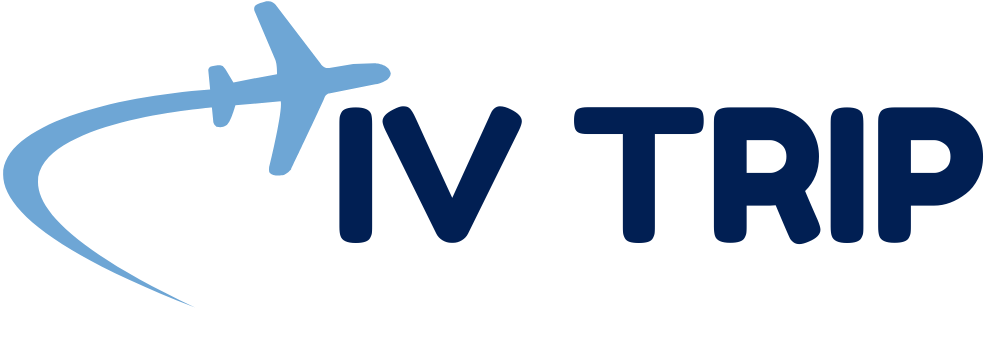Advanced Reporting: 7 Key Benefits for Travel Businesses

Advanced Reporting: A Game Changer for Travel Businesses
The travel industry today is awash with data – from flight and hotel bookings to customer feedback and expenses. Advanced reporting in this context means turning scattered travel data into clear, actionable insights and dashboards. By consolidating information from global distribution systems, CRM platforms, and financial tools, travel managers can now generate real-time reports and dashboards. This capability is a game-changer: it empowers agencies to spot trends, optimize prices, track key performance indicators (KPIs), and adjust strategies on the fly for a clear competitive advantage.
Travel Data Analytics: The Backbone of Smart Travel Management
Advanced reporting in travel relies on robust travel data analytics. This means collecting and analyzing data from all aspects of the travel business. Typical data sources include booking data (flights, hotels, tours), customer profiles, transaction records, and even external factors like weather or currency rates. The analysis of these diverse data types provides rich insights: for example, an agency can identify peak booking periods, high-demand destinations, or frequent travelers’ preferences. By unifying this data, agencies avoid blind spots, and they see the full picture of their operation.
In practice, agencies use analytics to answer questions like
- Which tours or flights are most profitable?
- What is the average spend per customer, and where can we improve it?
- How effective are our marketing campaigns or promotions?
- Where do customers drop off or cancel bookings, indicating issues?
By continuously answering these questions with data, travel businesses gain agility and competitiveness. For instance, if analytics show a particular destination is suddenly trending, an agency can ramp up promotions or adjust inventory quickly. Conversely, if costs are rising in one area (e.g., expensive last-minute bookings), managers can revise policy or negotiate better rates.
Data analytics solutions provide even broader benefits. TravelBank notes that analytics tools give “greater visibility into spending,” help optimize costs, enforce compliance, and spot irregular spending patterns. Similarly, SAP Concur highlights that travel analytics play a crucial role in cost-saving, policy enforcement, risk reduction, and enhancing the traveler experience. Together, these insights show that travel agencies armed with advanced reporting can optimize their operations, ensure compliance, and improve traveler satisfaction—all at once.
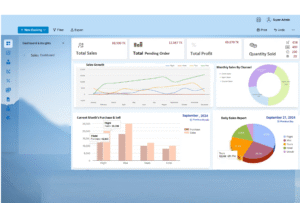
Benefits of Advanced Reporting for Travel Businesses
Advanced reporting brings tangible benefits that can transform a travel business. Here are the core advantages:
- Data-Driven Decision Making: With dashboards and automated reports, travel managers no longer rely on guesswork. They can instantly see which tours are selling best, where demand is growing, or where costs are rising. IBM reports that advanced reporting provides organizations with insights into customer behavior and market demands, helping identify new opportunities. In travel, this means adjusting itineraries or pricing based on real-time trends, rather than outdated forecasts.
- Increased Efficiency and Productivity: Advanced reporting automates data collection and analysis. Instead of compiling spreadsheets manually, staff see instant summaries on a dashboard. IBM cites cases where companies slash the time needed to compile reports from weeks to hours. In practice, this frees travel agents and managers to focus on strategy and customer service. For example, automating weekly sales and expense reports eliminates tedious tasks and reduces errors.
- Cost Savings and Better Budget Control: By consolidating data, advanced reporting helps cut costs. Travel analytics can highlight inefficiencies, such as overbooked suppliers or employees breaking policy by booking premium tickets. Concur explains how identifying non-compliance (like off-policy bookings) can save money and improve accountability. IBM notes that business reporting “significantly reduces costs by streamlining decision-making and providing quick insights.” In travel, this might mean spotting unnecessary expenses early or reallocating budgets to the most profitable routes.
- Enhanced Customer Experience: Better data leads to happier customers. Advanced reports track customer satisfaction, travel preferences, and feedback. Agencies can spot pain points (e.g., hotels with consistent complaints) and act on them. For instance, Concur’s travel analytics include monitoring traveler well-being and risks. An agency might flag a series of delays with a particular airline, then proactively adjust future bookings to avoid inconvenience. This proactive service builds trust and loyalty.
- Improved Forecasting: By analyzing historical travel data and trends, agencies can better predict future demand and adjust strategies. Advanced reporting tools make this possible by consolidating past performance into predictive models. Improved forecasting helps in budgeting and resource planning. For example, if data shows summer tours always surge in May, an agency can prepare inventory and staffing in advance. The result is a proactive stance rather than reactive scrambling.
- Future Growth and Competitive Edge: In a fast-paced market, analytics is a competitive edge. Agencies using data can quickly adapt to new trends or seize opportunities that others miss. Gartner notes that embedded BI dashboards make decision-makers more agile. In travel, being first to market with a new package (like an eco-tour or wellness retreat) can attract more customers. Advanced reporting lays the groundwork: it reveals those market shifts early. In summary, advanced reporting turns raw travel data into a strategic asset that drives growth and efficiency.
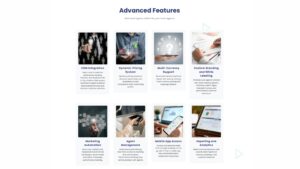
Key Features of Modern Travel Agency Software
To leverage these benefits, agencies need the right tools. Today’s business management software for travel agencies is expected to include advanced reporting as a core capability. Key features of these modern platforms include:
- Real-Time Dashboards and KPI Tracking: Software compiles data from bookings, finance, and CRM into live dashboards. Agents can view critical KPIs (total bookings, revenue by package, profit margins) at a glance. For example, Implevista’s IV Trip platform features a Real-Time Analytics Dashboard, where managers “quickly see which tours are most profitable, which customers book most often, and forecast future demand.” These dashboards are highly configurable, allowing filtering by date range, package type, or agent.
- Automated Reporting and Alerts: Instead of manually pulling reports, agencies schedule them in advance. The system can email weekly summaries or alert staff when KPIs hit certain thresholds (e.g., bookings drop 20%). This automation saves time and catches issues early. IBM notes automated reporting frees employees from data wrangling, letting them focus on high-value activities.
- Integrated Booking and Financial Systems: Modern travel software integrates directly with GDSs (like Sabre, Amadeus), hotel/holiday booking engines, and payment gateways. All bookings, cancellations, and payments flow into one system. This integration means reports include all relevant data without manual entry. For instance, a flight booked via an airline API instantly updates revenue figures. By unifying sales, CRM, and finance, the software eliminates silos and ensures reporting accuracy.
- Cloud-Based Access: Agents and managers can access reports anytime, anywhere. Cloud travel management solutions let team members on mobile devices view analytics on the go. As Implevista explains, cloud-based systems “handle bookings, payments, CRM, and reporting in the cloud.” This means a manager traveling abroad can still monitor office operations. Cloud also ensures the software updates automatically, so advanced reporting features evolve without IT headaches.
- Self-Service Analytics: Leading platforms let users create custom reports. Without needing IT, a travel director can drag and drop data fields to build a new chart (e.g., last-minute bookings by region). This self-service approach boosts data literacy across the agency. IBM emphasizes that collaborative, self-service reporting empowers all users to “make data-driven decisions.” In travel, even sales agents benefit from this insight to upsell or cross-sell based on data.
- AI and Predictive Insights (emerging): Some software is beginning to include AI analytics, such as demand forecasting or price optimization. While relatively new, these features will soon be mainstream. For example, analyzing historical booking patterns could suggest adjusting package prices before peak seasons. Travel analytics is evolving quickly, and software is starting to leverage these advances to provide truly forward-looking insights.
A travel data analytics dashboard displays key performance indicators (KPIs) and charts for a travel agency’s bookings and revenue. Leading platforms, such as those featured in Implevista’s Top Travel Agency Software, prioritize advanced reporting and analytics to streamline operations. For instance, IV Trip offers real-time dashboards that let managers instantly view bookings by destination, date, or agent—turning data into a continuous feedback loop. With integrated CRM features, agencies can track customer histories, analyze retention, and personalize offers. When choosing travel agency software in Bangladesh, prioritize solutions with advanced reporting or real-time analytics for smarter decision-making.
Business Management Software for Travel Agencies in Bangladesh
The travel market in Bangladesh is expanding rapidly, and local agencies need modern tools to stay competitive. Travel agency software in Bangladesh should blend local relevance with global functionality. Implevista’s IV Trip, developed in Bangladesh, is designed specifically for this purpose. It supports local languages, payment gateways, and compliance requirements, while offering the same advanced reporting capabilities found in leading international systems.
For many Bangladeshi agencies, complex bookings such as group tours or religious trips require detailed insights. Advanced reporting helps them analyse customer trends, identify peak seasons, and understand booking patterns. For instance, analytics may reveal increased international package sales after festivals or seasonal spikes in domestic travel. With this data, agencies can adjust pricing, refine inventory, and improve marketing efficiency. As Implevista notes, IV Trip stands out as the best travel agency software in Bangladesh for its regional focus and robust analytics.
Local support and flexibility are also major advantages. Because Implevista is based in Dhaka, it can tailor reports, add custom fields like visa tracking, and provide training in Bengali. Many agencies still rely on spreadsheets, which are prone to duplication and error. A unified platform like IV Trip integrates accounting and reporting, automatically displaying commissions and taxes in Bangladeshi taka. With advanced reporting tools, agencies can make data-driven decisions—such as identifying underperforming packages and reducing unnecessary costs. For a closer look at how analytics empower travel businesses, explore Implevista’s IV Trip platform and its customer success stories.
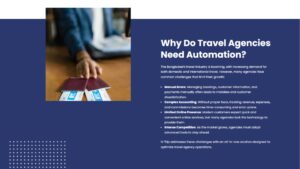
Implementing Advanced Reporting: Best Practices
Having great software is only half the battle. To fully benefit from advanced reporting, travel businesses should follow best practices:
- Define Clear KPIs: Agree on a concise set of metrics (e.g. total spend, revenue per trip, customer satisfaction). Clear KPIs focus your reporting on strategic goals. Implevista’s analysis of travel KPIs suggests metrics like Trip Purpose Mix, Traveler Satisfaction, and Cost Savings. Start with a short list of top KPIs and expand as your team adapts.
- Centralize Data Sources: Ensure all relevant data feeds into your analytics system. Connect reservation systems, finance, CRM, and marketing channels. Clean and standardize data (consistent customer IDs, unified account codes). As Atlan’s guide warns, data integration is a challenge; invest in robust connectors or use a platform like IV Trip that integrates all modules out of the box.
- Automate Reports and Alerts: Schedule routine reports (daily, weekly, monthly) and set alert thresholds. For example, an automated monthly spend report might flag when bookings exceed budget by a certain percentage. Automation saves time and highlights issues instantly, just as IBM notes with its Cognos tool.
- Train Your Team: Provide training so staff know how to use dashboards and custom reports. Encourage a data-driven culture by sharing insights in meetings. As Implevista advises, modern reporting tools should allow leaders to “track performance and make data-driven decisions in real time”; ensure everyone has access to that capability.
- Iterate and Improve: Use feedback to refine your reports. Remove unused charts and add new ones as needs evolve. Keep the number of reports manageable – a handful of well-designed dashboards usually covers most needs. Advanced reporting should evolve with your business. For example, if new travel products are added, update or create dashboards for those to maintain visibility.
By following these steps, travel agencies will avoid common pitfalls (like data silos or analysis paralysis). The goal is clear: actionable insights, not just more data. Advanced reporting, when implemented right, becomes a self-improving system: better decisions lead to better performance, which in turn provides more data to refine the analysis.
Embrace Data-Driven Travel Management
Advanced reporting is not just a buzzword; it is a strategic asset for travel businesses. We have seen how travel data analytics and real-time dashboards allow agencies to make smarter decisions, save costs, and delight customers. In practice, a travel manager using these tools can immediately spot an uptick in demand for a specific tour, adjust marketing spend, or identify an underperforming product and act.
Remember: any travel platform without built-in advanced reporting is falling behind industry standards. In today’s travel marketplace, advanced reporting is expected. Agencies that neglect it risk missing out on critical insights that drive competitive advantage. Advanced reporting synthesizes all these benefits into one unified view, giving travel executives timely, actionable data to guide strategy. As industry experts note, analytics helps companies “navigate complexities with confidence” – and travel businesses are no exception.
Ready to transform your travel business? If you want to harness the power of advanced reporting, contact IV Trip and our travel management solutions. For more insights, subscribe to our blog. Learn more on our features page to see advanced reporting in action. Data-driven travel management is here – don’t get left behind.
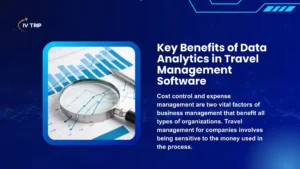
FAQ: Advanced Reporting
Q1: What is advanced reporting in travel businesses?
A: Advanced reporting means using sophisticated analytics tools and dashboards in travel management software. It automatically gathers data from bookings, finance, CRM, and more, and presents it in real time. This enables agencies to track KPIs (like bookings per month or total spend), spot trends, and make informed decisions. Unlike basic reports, it’s automated and interactive.
Q2: How can travel data analytics help my travel agency?
A: Travel data analytics turns raw data into actionable insights. It can help you identify cost-saving opportunities, enforce travel policies, improve supplier negotiations, and personalize customer experiences. For example, by analyzing spending patterns, you can negotiate volume discounts or adjust budgets. According to SAP Concur, analytics in travel programs leads to cost optimization and risk reduction while enhancing traveler safety.
Q3: What features should travel agency business management software have?
A: Key features include real-time dashboards, automated reports, CRM integration, and mobile access. It should integrate GDS booking systems, handle invoicing, and track customer histories. Crucially, it must have strong analytics and reporting modules. Implevista notes that top travel agency software “incorporates strong analysis and reporting features” to analyze trends in sales and markets. If you see “advanced reporting” listed, that software likely meets these needs.
Q4: Why is advanced reporting a game-changer for travel companies?
A: Because it provides immediate, data-driven clarity. Travel markets can shift rapidly (e.g., new travel restrictions or a sudden popular destination), and advanced reporting keeps you informed. By automating data collection and analysis, your team saves time and reduces errors. IBM highlights that advanced reporting delivers actionable insights so leaders don’t rely on guesswork. In travel, this means optimizing itineraries, pricing, and service in near real time – a significant advantage.
Q5: How does IV Trip software support travel data analytics?
A: IV Trip is a cloud-based travel management system by Implevista that includes built-in reporting dashboards. It centralizes flight, hotel, and package data with financial and CRM data. The Real-Time Analytics Dashboard shows sales, occupancy, revenue per package, and customer segments. Users can generate customized reports (by date, agent, product) directly in the interface, making it easy for agencies to analyze performance without exporting to Excel.
Q6: Can travel agencies in Bangladesh implement advanced reporting easily?
A: Yes. Solutions like IV Trip are designed with Bangladeshi agencies in mind. They support local currency, payment gateways, and compliance needs, plus local-language interfaces if needed. Deployment is straightforward because the software is cloud-based. Implevista even offers training and support locally in Dhaka. Once implemented, Bangladeshi agencies get the same advanced reporting features – real-time dashboards and automated reports – to manage everything from local tours to international bookings.
Q7: What metrics should travel businesses track with advanced reports?
A: Common metrics include total travel spend, revenue per trip, booking count, average margin, and policy compliance rate. You may also track cost per booking channel, customer satisfaction scores, or loyalty program engagement. SAP Concur suggests tracking total spend and policy compliance to spot anomalies. The right metrics depend on your goals; ensure your software lets you measure what matters to your business.
Q8: Is advanced reporting the same as Business Intelligence (BI)?
A: They’re closely related. Advanced reporting is essentially a user-friendly form of BI. Both involve analyzing data to inform decisions. The difference is mainly emphasis: advanced reporting highlights the automated reports and dashboards front-end, whereas BI includes the broader strategy of using data. In practice, a platform offering advanced reporting usually provides full BI capabilities behind the scenes – data integration, dashboards, self-service analysis, etc.
Q9: Is advanced reporting the same as data analytics?
A: Advanced reporting is a type of data analytics focused on generating automated reports and visualizations for business users. In travel, data analytics can include deeper methods like forecasting or machine learning. But in common usage, “advanced reporting” in travel software means having built-in dashboards and analytics tools. It’s often paired with terms like “travel data analytics” or “travel BI,” all aiming to help agencies make sense of their data.
Q10: How do I choose the right travel software with advanced reporting?
A: Start by listing your must-have analytics features (e.g., real-time dashboards, custom reports). Look for solutions built for travel, such as IV Trip, that integrate bookings, CRM, and finance. Evaluate the user interface (is it easy to create reports?) and data freshness. Ask vendors how quickly you can get a report on last month’s bookings. Also consider local support – for example, Implevista’s IV Trip has dedicated support in Bangladesh. Try demos and free trials to see the reporting tools in action before deciding.
